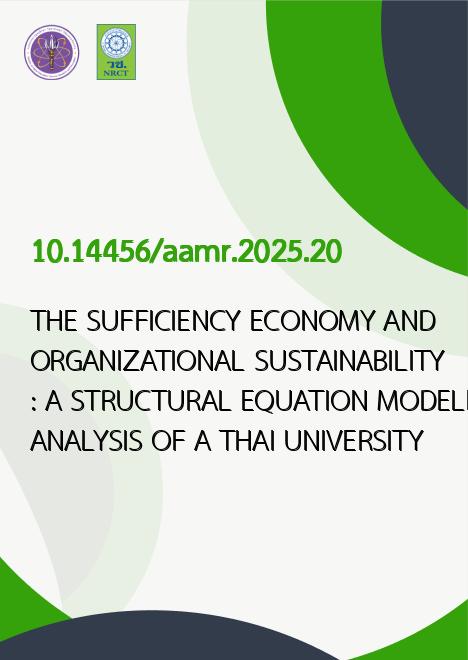
|
THE SUFFICIENCY ECONOMY AND ORGANIZATIONAL SUSTAINABILITY: A STRUCTURAL EQUATION MODELING ANALYSIS OF A THAI UNIVERSITY |
|---|---|
| รหัสดีโอไอ | |
| Creator | Duangnapa SUWANNATADA |
| Title | THE SUFFICIENCY ECONOMY AND ORGANIZATIONAL SUSTAINABILITY: A STRUCTURAL EQUATION MODELING ANALYSIS OF A THAI UNIVERSITY |
| Publisher | Asian Administration and Management Review |
| Publication Year | 2568 |
| Journal Title | Asian Administration and Management Review |
| Journal Vol. | 8 |
| Journal No. | 1 |
| Page no. | Article 20 |
| Keyword | Sufficiency Economy, Organizational Sustainability, Structural Equation Modeling, Higher Education, Thailand |
| URL Website | https://so01.tci-thaijo.org/index.php/AAMR |
| Website title | https://so01.tci-thaijo.org/index.php/AAMR/article/view/278373 |
| ISSN | 2730-3683 |
| Abstract | This study investigates the relationship between the Sufficiency Economy Philosophy (SEP) and organizational sustainability within the context of Rajabhat Maha Sarakham University in Thailand. Employing a quantitative research design, data were collected via questionnaires from 242 personnel across 33 university departments. A structural equation model (SEM) was employed to analyze the relationships between SEP principles (leadership, human resource management, organizational culture, and other key operational aspects) and dimensions of organizational sustainability (economic, social, and environmental). The findings revealed a strong positive relationship between SEP principles and organizational sustainability, with human resource management and financial management emerging as key mediators. Specifically, integrating SEP strongly influenced environmentally sustainable practices, such as greenhouse gas emission reduction and adherence to environmental regulations. This study underscores the value of the SEP as a framework for enhancing organizational sustainability in Thai universities. It suggests that strategic human resources and financial management play pivotal roles in achieving sustainability goals within this context. The study also incorporates stakeholder suggestions for further developing sustainable practices, offering valuable insights for enhancing organizational performance and contributing to the broader goal of sustainable development within the higher education sector in Thailand. |
